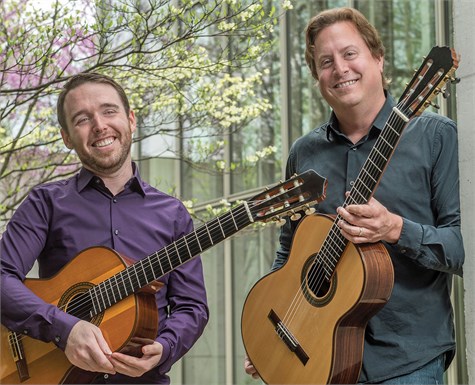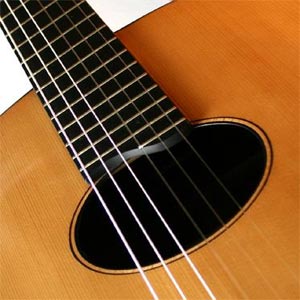by Jarrett Hoffman and Mike Telin

On Saturday, June 6 at 2:00 pm (Eastern Time), CICGF will offer a live-streamed concert featuring two mainstays of the Festival: Jason Vieaux and Colin Davin, who co-head the guitar department at CIM in addition to sharing numerous honors between them as performers. Tickets are $10 each and can be purchased online, with all proceeds directly benefiting the artists.
ClevelandClassical.com’s Jarrett Hoffman reached Colin Davin by Zoom to talk about his half of the program: Pedro Elías Gutiérrez’s Alma Llanera (arranged by Alirio Diaz), Leo Brouwer’s El Decameron Negro, Radamés Gnattali’s Brasiliana No. 13, Agustín Barrios Mangoré’s Julia Florida, and Fernando Bustamante Misionera (arranged by Jorge Morel).
Jarrett Hoffman: I understand that you planned your program around Jason’s.
Colin Davin: You know, I didn’t exactly plan it around Jason’s program, but I did have his before I chose my pieces, so it certainly informed it a bit. For one thing, I obviously didn’t want to copy any repertoire, but I did want to make a few connections. My closing piece, for example, is Misionera by the Argentine composer Fernando Bustamante, but it’s actually written in a Paraguayan style, and it was arranged for guitar by Jorge Morel, who is the composer of the first piece that Jason will play. So there’s a little bit of a bridge there.
I knew I wanted to have a Latin American focus. That can take on so many forms, and with a half-recital program, it’s pretty tough to get the entire scope — even with a 20-hour program, you couldn’t cover the full scope of Latin American music. But nonetheless, I do have five different countries represented in the five pieces, starting with Venezuela and moving to Cuba, Brazil, Paraguay, and Argentina.
JH: How did this joint performance come about?
CD: It’s something that had been on my mind really since things started shutting down and concerts started being cancelled. It became clear pretty quickly that the Guitar Festival was not going to happen this June. Even if by some miracle, things were better and CIM was able to open, we didn’t feel like people were going to show up. We also didn’t want to put people in the position where they felt like maybe they could show up for something, and then we would start spreading this disease.
Jason and I play on the festival every year, and I’ve been attending since I was in middle school, so more than any of the other concerts that were canceled, this one was a bit of a personal loss. So we wanted to do something. I pitched the idea, and Armin [Kelly, CICGF artistic director] and Jason were both on board with it right away. Then we started figuring out how to do it. We were going to use Zoom, but we’ve been learning some of its limitations. Ultimately we decided to stream this over YouTube, and we’re going to wear masks and be in the same room.
JH: How did you decide to go that route?
CD: We wanted to find a way to balance the issue of community safety with presenting a quality production — with absolutely no audio engineering professionals nor technical wizards among the three of us. So I’ve been gradually learning a few things about how to mic guitars for recording, and how to run Open Broadcaster Software, OBS, which a bunch of musicians are learning about through YouTube tutorials right now. I never thought I’d see so many YouTube videos that are geared toward gamers — one of the biggest things in the live streaming world is people streaming themselves playing video games. My YouTube suggestions are all out of whack right now from my normal set of interests (laughs).
So I kind of learned this software, and I’ve got a couple of pretty good microphones and have tested them out at different setups and distances. We were really looking to get consistency in the production quality, and I figured that if I were in this room, and Jason were at his house with a different microphone, one might turn out better, or they might not be calibrated equally.
So we’re actually going to be playing at Armin’s house, which is also his place of business as a guitar dealer for Guitars International. We’ll be in the room where he has people audition guitars when they’re looking to buy one, so it has a nice acoustic to it. We’re also going to be playing in front of a window with some greenery in the background, so it doesn’t quite replace Mixon Hall, but we get a little bit of that garden ambience.
JH: Will you and Jason be switching back and forth, or dividing the program down the middle?
CD: The plan is to divide right in half, mostly just for logistical smoothness. We put together a recital on Zoom for our students at the end of the semester, which I think was informative for how we wanted to do this. In that instance, I hosted the Zoom meeting and kind of played the role of emcee. I introduced the performers and the pieces, and I was clicking away, spotlighting different screens and making sure all the guests were muted.
It was a lot of hands-on work, for one thing, so we didn’t want to have to do that with this concert. But that did allow us to have more of a variety show. No one played two pieces in a row. They bounced around, and I made what I thought was the most convincing concert program based on the repertoire that the students were playing. So we made that work — with variable sound and video quality, of course, because everyone was on their own devices.
But for this concert, we’re just going from one half to the other. I’m learning how to put up an intermission screen while we change over the set, so you won’t be awkwardly looking at us switching places and stumbling over wires and whatnot. It’s been an interesting adventure self-teaching all this stuff, but I think it’s going to come together well. And we’ll sneak in a duo at the end — a masked encore.
Mike Telin spoke to Jason Vieaux by telephone from his home in Lakewood and began the conversation by asking him how he has gone about adjusting to these uncertain times.
Jason Vieaux: Two thirds of my income comes from playing concerts, and when everything began to shut down, that evaporated. So I’ve had to take on a completely new way of doing things — long term planning is not happening right now.
Basically I’ve been spending a lot of time in my basement studio, but one of the positive outcomes is that I’ve been composing like crazy. I’ve written an entire album full of solo guitar music and I’m premiering two of those pieces on the concert.
Mike Telin: I know you’ve arranged a lot of things, but have you always wanted to compose?
JV: I always knew that I could write, so I knew if I sat down for five minutes a ton of stuff would come out. My wife Irene, who is a nurse, told me years ago that I should be writing but I always thought, when do I have time to do that with all of the concerts, teaching at two conservatories, and a wife and kids?
When everything ended, I had all this time. I wrote ten pieces that just floated out of me. It was great.
MT: Tell me about the two you’re playing.
JV: The tremolo piece I’m calling Home. It was written about a month ago when I was in a period of acceptance of what was happening. It’s tonal, but definitely of this time. My jazz background and leanings play into it a little bit. It’s the same with Elegy/Prayer [in honor of the frontliners]. The frontline workers are the ones who are going down. You read these horrible stories in the media about nurses dying after someone coughs.
MT: I see you’re including Jorge Morel’s Danza Brasilera.
JV: I haven’t played this piece in years — I don’t even remember the last time I played it. I was teaching it to one of my ArtistWorks students and was practicing it so I could demonstrate. So I thought, why don’t I just play it on June 6. It’s all about thinking efficiently. I also played it for the CIM commencement this year.
MT: Remind me which group of works Isaac Albéniz’s “Cuba” is from.
JV: His publisher posthumously added it to his Suite Española, Op. 47. From their standpoint that’s where it belongs. It’s a great piece.
MT: You’re also playing some Manuel Ponce.
JV: Yeah, Sonatina Meridional. This is the “Spanish sonata.” I put it in quotes because Segovia would enlist Ponce to compose these almost quasi-ghost-written pieces that were meant to sound like other composers. This is the last of the five and Segovia told Ponce that he wanted something very Iberian. This is a piece I’ve been playing since I was seventeen. For this program I’m going back to some old repertoire along with my two two new pieces.
MT: You’ll conclude with a work by the master himself: Andrés Segovia’s Estudio Sin Luz.
JV: That’s right. He wrote a few pieces and I think this one is great. It’s on my Grammy-winning album Play. It’s also one of my dad’s favorite pieces and since I’m looking after my dad a lot, I thought it would be nice to include it. I’ve been playing it since I was thirteen, and although I recorded it for the album, I’ve never been able to fit it into a program. So I thought this was the perfect time.
Published on ClevelandClassical.com June 3, 2020.
Click here for a printable copy of this article




